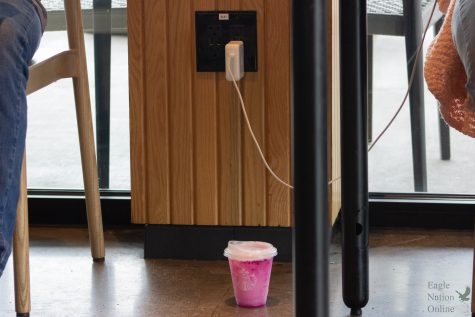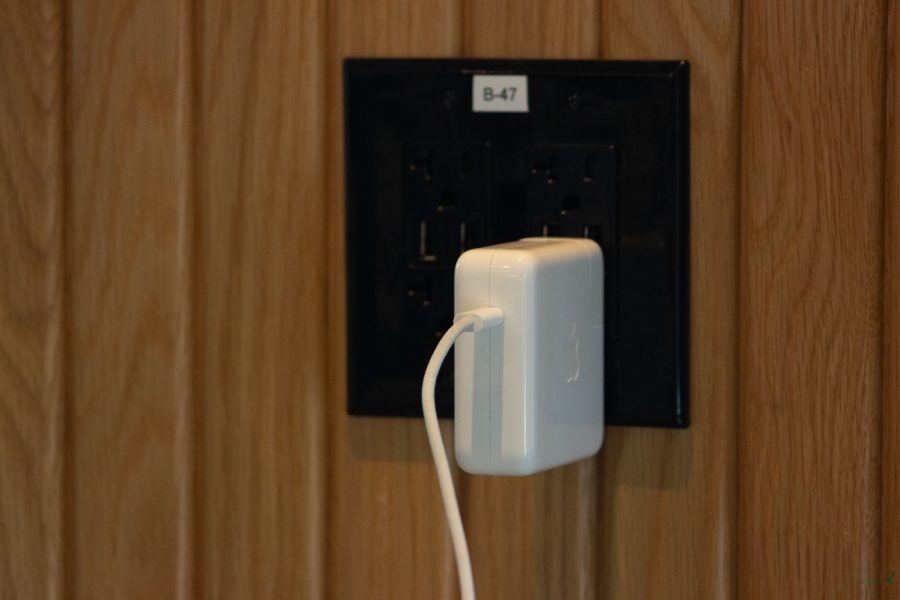Experts warn against dangers of juice jacking
Article covers ways to protect personal technology from cyber attacks
Juice jacking, a form of a cyber crime that involves stealing data or installing malware on a device through a USB charging port, has become an increasingly common threat in today’s time. As more and more people rely on their phones and other devices to stay connected, the convenience of public charging stations has made it easier for cyber criminals to carry out their attacks. “Training and awareness would be the best sources of prevention,” Chief Technical Officer Fernando De Velasco said. “We also install our own electric outlets and purchase the charging outlets (like the portable units,) so we know those come without any issues. People are not aware of this issue in general, and having convenience outlets in many public spaces adds to this problem.”
Juice jacking, a form of a cyber crime that involves stealing data or installing malware on a device through a USB charging port, has become an increasingly common threat in today’s time. As more and more people rely on their phones and other devices to stay connected, the convenience of public charging stations has made it easier for cyber criminals to carry out their attacks.

Juice jacking can compromise the security of your personal and sensitive information. When you plug your device into a public charging station, you are essentially giving the charging station access to your device’s data. Cyber criminals can take advantage of this by installing malware or stealing data from your device without your knowledge. According to FCC officials, a device can be locked by malware created through a damaged USB connection, and it can export user information and passwords to the offender. The information can subsequently be sold or used by criminals to breach online accounts. This can include private information like passwords, financial data, and confidential business information.
Another danger of juice jacking is that it can happen quickly and easily. Cyber criminals can set up fake charging stations in public places such as airports, shopping centers and cafes. An article from CBS News referenced the 2022 USB Threat report by Honeywell Forge, over four years, the percentage of threats aimed at spreading via USB or specifically targeting USB for infection increased to 52%. These fake charging stations may look like real charging stations, but they are actually designed to steal your data. Once you plug your device into a fake charging station, the cyber criminals can access your data and install malware on your device.
Two out of 17 students in CTE Kerry Phillis’ Principal of Audio and Video class knew about juice jacking when asked the question.
Freshmen Juan Gutierrez and Andrew Dipasquale rasied their hands when asked about juice jacking.
“Alright, so first I found out about juice jacking (around) a year ago,” Gutierrez said. “I found out about it on YouTube. I was just scrolling around there.”
Gutierrez and Dipasquale have never experienced juice jacking, nor has anyone they know.
“Okay, the last time I heard about it was about a couple of weeks ago,” Dipasquale said. “I heard about it online, and a news article that my mom sent, in, like, a family group chat.”
Chief Technical Officer (CTO) Fernando De Velasco has 25 years of experience in the IT department, and has been working at PISD since 2006. De Velasco started working as CTO in 2017. In De Velasco’s years of working in PISD he hasn’t had any students that have been affected by juice jacking.
“Training and awareness would be the best sources of prevention,” De Velasco said. “We also install our own electric outlets and purchase the charging outlets (like the portable units,) so we know those come without any issues. People are not aware of this issue in general, and having convenience outlets in many public spaces adds to this problem. People tend to go and plug their phones anywhere they need without worrying about if the charging location is safe. This is similar to public WiFi networks; you never know who is in the public network and people connect without too much thought to it.”
How to Protect Yourself from Juice Jacking
There are several steps you can take to protect yourself from juice jacking. The first and most important step is to avoid using public charging stations whenever possible. Instead, bring your own charger and use a wall outlet to charge your device. This will help ensure that your device is not exposed to potential security risks.

If you must use a public charging station, make sure that you only use reputable charging stations from trusted sources. Avoid using unknown or unverified charging stations, and never use a charging station that looks suspicious or out of place. If you are unsure about a charging station’s legitimacy, ask a staff member or security personnel for assistance.
Another way to protect yourself from juice jacking is to use a charging-only USB cable. These cables are designed to only transfer power, not data, which makes them more secure than regular USB cables.
According to NetRise CEO Thomas Pace, using a USB data blocker, a tiny dongle that offers an extra layer of security between a device and the charging port, people may take caution. Instead of using a public charging station, you can alternatively use a portable battery pack to charge your smartphone. This will assist with maintaining the security and safety of your device.
Freshman Samy Benmiloud has his own strategies to prevent becoming a victim of juice jacking.
“In order to prevent juice jacking, I make sure that all my devices are charged before leaving the house,” Benmiloud said. “I make sure to bring an extension cord, just in case I need to charge my phone or device whenever I’m out.”
Sophomore Emma Renteria was one of Ms. Phillis’ students that had not heard about the topic. When she heard about what it was, she thought of a solution.
“I think I might start carrying a portable charger with me – instead of just plugging in my stuff, ” Renteria said. “It doesn’t say that they can hack into that (portable chargers).”
Juice jacking poses a serious threat that can compromise the security of your personal and sensitive information. To protect yourself from this type of cyber crime, it is important to avoid using public charging stations whenever possible, and to only use reputable charging stations from trusted sources. By taking these steps, you can help ensure that your device stays safe and secure, and that your personal and sensitive information remains protected from cyber criminals.
Your donation will support the student journalists of Prosper High School. Your contribution will allow us to purchase equipment and cover our annual website hosting costs.

Honors & Awards
2 Best of SNO publication
1 BITS Award
1 UIL Honorable Mention in Feature Writing
1 TAJE Excellent in Feature Writing














